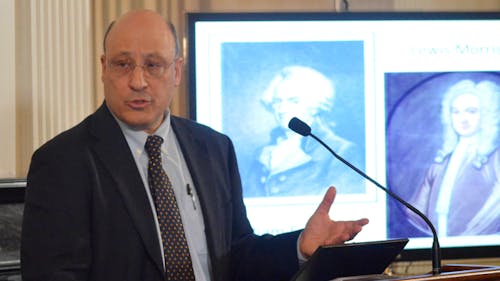Author discusses history of NJ governors

Looking back at the governors of New Jersey, Michael Birkner said very little scandal surrounds governorship, and no New Jersey governor has ever been impeached for crimes or misdemeanors.
Though recent scandal may exist around Gov. Chris Christie, Birkner said it is too soon to write Christie off as a 2016 presidential contender.
Birkner, author and editor of “The Governors of New Jersey: Biographical Essays,” spoke yesterday at the Eagleton Institute of Politics about the second edition of the book, which is an updated version of its 1974 counterpart.
The newest version of the book, which was celebrated at last night’s event, has information about New Jersey governors from 1974 until today.
John Weingart, associate director at the Eagleton Institute of Politics, opened the event and said the institute has been trying to collect information about recent governors of New Jersey and governors across the country because no academic center in the country focuses on the office of the governor.
The institute works to collect historical as well as odd pieces of information with one goal being able to understand what it is about governors that can cross timelines and how the work of a past governor can help a contemporary one.
Birkner, the Benjamin Franklin Professor of the Liberal Arts and professor of history at Gettysburg College, has written 12 books. He spoke on the three themes that were the power of the governor’s office as they have evolved, the quality of New Jersey’s governors and the issue of corruptions and scandal.
Starting with the power of colonial period governors, Birkner spoke about the fact that they were often frustrated, disengaged and tormented by local elites.
Though some were diligent and reasonably effective governors, most were people who had the right connections and wanted money.
The most infamous New Jersey colonial era governor was Edward Hyde, the state’s only transvestite governor. His goals were to assert the royal authority and make money.
His governorship did not work out, thanks to the consistent opposition from local elites.
“Those thinking about the governorship as a power base don’t need to envy the colonial governors,” Birkner said.
Colonial governors did not have the tools to govern effectively, he said. They had no formal influence in the making of legislation and no meaningful veto power.
“The governor was not a policy pusher or a policy implementer,” Birkner said.
He spoke of Woodrow Wilson, the only New Jerseyan ever elected president, who served as governor at the height of the progressive era and was in sync with the idea that big businesses can corrupt politics and needed to be regulated.
Birkner separated the state’s governors since 1947 in four categories: outstanding, strong — but deficient in some ways — mediocre and utterly disappointing. He said the state has seen some “darn good” modern governors.
He praised Leon Abbott, who sponsored a law requiring employers to pay their workers in cash and whose greatest crusade was to tax the railroads, as an outstanding governor.
“You could argue that Leon Abbott was a harbinger of the progressive movement,” he said.
The parameters for being an outstanding governor related to whether the person had emotional intelligence, a way of connecting with the average person and the ability to cajole the legislature.
He also said Richard Hughes, who originally wanted to be a district court judge, was considered a throwaway candidate in 1961 in a time that New Jersey was not as blue a state.
Hughes was running against a progressive Republican at the time, but he out-campaigned James Mitchell and came to transform governance in New Jersey.
He negotiated a deal that made possible the construction of the World Trade Center and supported the first funding for public broadcasting in New Jersey.
Raymond Bramucci, who served in James Florio’s administration, stood up at the end of the lecture and proclaimed that Florio belongs in the outstanding category for his honesty and for his ability to deal with the opposition he faced when he entered office.
After highlighting those in the outstanding category, Birkner said George McClellan was a disappointment as governor because he did not offer any new or creative ideas and barely involved himself in the governance.
At the end of his term, McClellan called it a nuisance to have to travel to Trenton, N.J., showing his lack of commitment and passion for the job.
Birkner is happy the book does not include any essays on Christie because it is too soon to discuss the impact of his term.
The book addresses the past three decades’ worth of New Jersey governors.



